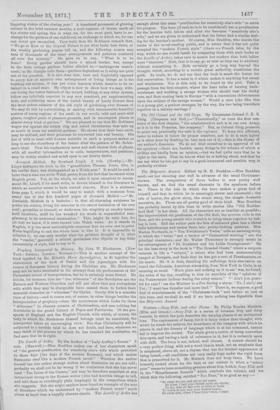The. Lovells of Arden. By the Author of "Lady Audlay'a
Secret." 3 *cols. (Maxwe)l.)—Miss Braddon makes one of her characters speak of "the general predilection for somebody else's wife which provailed in those days [the days of the ancient Romans], and which makes Suetonius read like a modern French novel." Whether the author heraolf has this rather strange notion about Suotonius we are not told ; probably we shall not be far wrong if we conjecture that she has never vend "The Lives of the Coosars," and may bo therefore acquitted of any intontional wrong to the Roman writer (who had horrible things to toll, and told thorn in revoltingly plain language) in the comparison which elm suggests. But she might anyhow have found an example of tho sort of literature which we understand by " modern French novel " much closer at hand than a happily obscure classic. The Lovells of Arden has enough about this same "predilection for somebody else's wife" to serve the purpose. The hero (if such he is to be considered) has a predilection for the horoino both before and after she becomes " somebody oleo's wife," and we are given to understand that his father had a similar fool- ing for the horoino's mother. Of course, Miss Braddon, who knows the tastes of the novel-reading public, and is aware that it has not quite accepted tho " modern French style " (there are French tales, by the way, which no ono would insult by comparing them with such books as the Lore//n of Arden), takes care to assure her readers that both ladies were "innocent." Both, that is to nay, go as near as they can to adultery without committing it. Both certainly go a long way beyond the thought, whioh, according to a certain groat authority, constitutes the guilt. In truth, we do not see that the book is mach the better for this reservation. It has a taint in it which makes it anything but sweet and wholesome. Nor is this only to be found in the plot. Take a passage from the first chapter, where the hero talks of turning back- woodsman and wedding a savage woman who should roar his dusky race, and then coming back to Europe "with a convenient obliviousness upon the subjoet of the savage woman." Would a man joke like this to a young girl, a perfect stranger, by the way, the two being travellers togethor in a railway-carriage ?


































 Previous page
Previous page